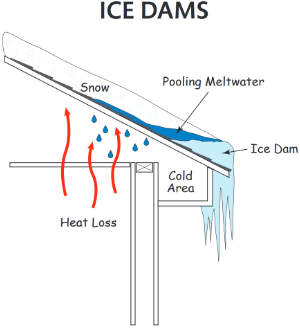Insulation
Click here to learn more about single-family, duplex, and condominium insulation rebates up to $8,000.
Click here for multifamily weatherization rebates up to $5,000.
Insulation saves money and increases comfort any time a house is heated or cooled. In the winter, insulation keeps the heat in, reducing heating costs. In the summer, it helps keep heat outside, reducing air conditioning costs.
Insulation reduces heat flow through walls and ceilings and air sealing reduces drafts. Collectively referred to as weatherization, they can make your home more affordable and comfortable. They can also reduce the risk of ice dams, frozen pipes, cold drafts, and moisture issues.
Ice Dams
Ice dams can form when warm air from inside a home leaks into the attic and melts snow on the roof. If enough water refreezes when it reaches the cold edge of the roof, an ice dam can form. Water damage on walls and ceilings occurs when water trapped behind the ice dam backs up under shingles and runs down into the home. Raking your roof can help avoid ice dams, but can be difficult and missing a storm can be an issue. Electrical heat tape can avoid ice dams, but can be expensive to operate. Weatherizing your home can eliminate ice dams while reducing energy bills and increasing comfort.
Frozen Pipes
Pipes can freeze and burst when they run through uninsulated spaces that aren’t heated. While heat tape or heating the space can reduce the risk, insulating the space can be a better solution. Insulation saves money on energy and it works even when the power goes out.
Cold Drafts
Air leaks in a poorly sealed home can collectively be equivalent to an open window. Cold air typically enters through gaps in the lower part of the home, absorbs heat, and exits through the upper floor and attic. This can cause a number of issues: drafts, high energy bills, dry indoor air, frozen pipes, and ice dams. Insulation without air sealing is like wearing a loose-knit sweater without a windbreaker on a windy day. Air sealing is typically done using caulking and flashing. Click here to learn more about air sealing.
Moisture Issues
Poorly insulated ceilings, walls, and floors can result in cold surface temperatures. This increases the risk of condensation, which can lead to moisture issues like mold, mildew, and rot. Weatherization professionals can reduce this risk.
Cost Savings
Home insulation can pay for itself through reduced heating and cooling costs in as little as three years.
Financial Example
| Low Income | Moderate Income | Any Income | |
| Installed Cost (50% materials) | $6,800 | $6,800 | $6,800 |
| Mail-In Rebate | $5,440 | $4,080 | $2,720 |
| Net cost before tax credit | $1,360 | $2,720 | $4,080 |
| 30% Federal Tax Credit (materials) | $204 | $408 | $612 |
| Net cost after tax credit | $1,156 | $2,312 | $3,468 |
| Energy Savings ($/year) | $420 | $420 | $420 |
| Payback Period (years) | 2.8 | 5.5 | 8.3 |
Your costs and savings may differ.
Getting Started
Efficiency Maine maintains a database of certified, insured, independent insulation installers across the state. These professionals can help you assess the best opportunities for your home. Click here to find installers near you and a list of questions to ask to help you decide which is the best fit for you.
